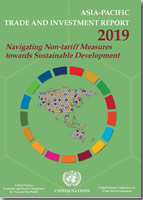
Fuelled by legitimate public policy concerns, as well as ongoing trade tensions, the number of non-tariff measures (NTMs) has risen significantly. While NTMs often serve important public policy objectives linked to sustainable development, the trade costs associated with NTMs are estimated to be more than double that of tariffs. As such, they have become a key concern for traders as well as for trade policymakers aiming to ensure that trade can continue to be an effective Means of Implementation of the 2030 Agenda for Sustainable Development.
In this year’s Asia-Pacific Trade and Investment Report, the United Nations Economic and Social Commission for Asia and the Pacific (ESCAP) has joined hands with the United Nations Conference on Trade and Development (UNCTAD) in examining the links between NTMs and sustainable development, the impact of NTMs in Asia and the Pacific, and how to best navigate NTMs towards sustainable development, building on good practices at the national, regional, and multilateral levels. The Report builds on a multi-year cooperation initiative in this area between ESCAP and UNCTAD, during which our two organizations have collaborated to support data collection in several Asian countries as a basis for evidence-based policymaking.
The Report shows that, based on their intended public policy objectives, almost half of the NTMs in Asia and the Pacific directly and positively address the Sustainable Development Goals (SDGs) such as, for example, those on health, safety and the environment. However, they also add 15% to the price of imports, and can also have a significant impact on investment. Data from private sector surveys suggest that domestic procedural obstacles are the primary reason why NTMs are difficult to comply with by traders. As such, the key is to ensure that, while public policy objectives and SDGs are met, traders are not unnecessary burdened, and trade costs are minimized.
To address trade costs while maintaining the benefits of NTMs, countries need to further enhance cooperation at all levels, as suggested in this Report. At the multilateral level, WTO agreements on sanitary and phytosanitary (SPS) measures, technical barriers to trade (TBTs) and Trade Facilitation should be fully implemented, while international standards that are adapted to countries at different levels of development should be developed and adopted. Regional initiatives should also be actively pursued, such as NTM harmonization and mutual recognition initiatives in regional trade agreements. Digitalization of NTM-related procedures should also be prioritized, as already envisaged under the ASEAN Single Window Agreement and the broader Framework Agreement on Facilitation of Cross-border Paperless Trade in Asia and the Pacific. At the national level, new and existing NTMs and related procedures should be systematically subjected to sustainability impact assessments; this should include effective consultations with the private sector and stakeholders with special needs, including SMEs and women.
We believe that this Report will help policymakers in their ongoing quest for trade and investment policies that support the implementation of sustainable development as well as encourage the donor community to provide more capacity-building and technical assistance to member States. ESCAP and UNCTAD will continue to work hand-in-hand in this area, together with other relevant partners.

Armida Salsiah Alisjahbana
Under-Secretary-General of the United Nations and Executive Secretary of the United Nations Economic and Social Commission for Asia and the Pacific

Mukhisa Kituyi
Secretary-General
United Nations Conference on Trade and Development



